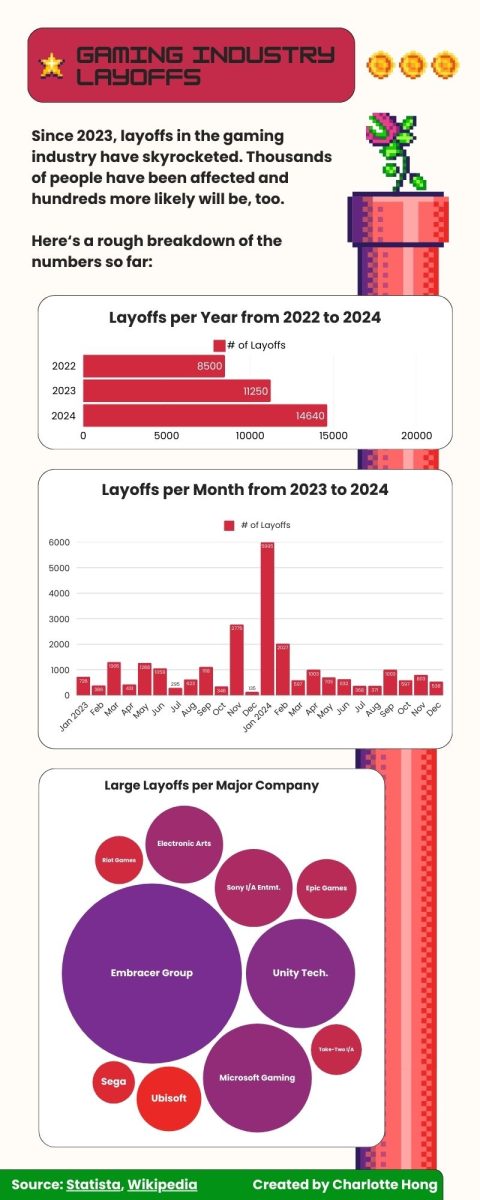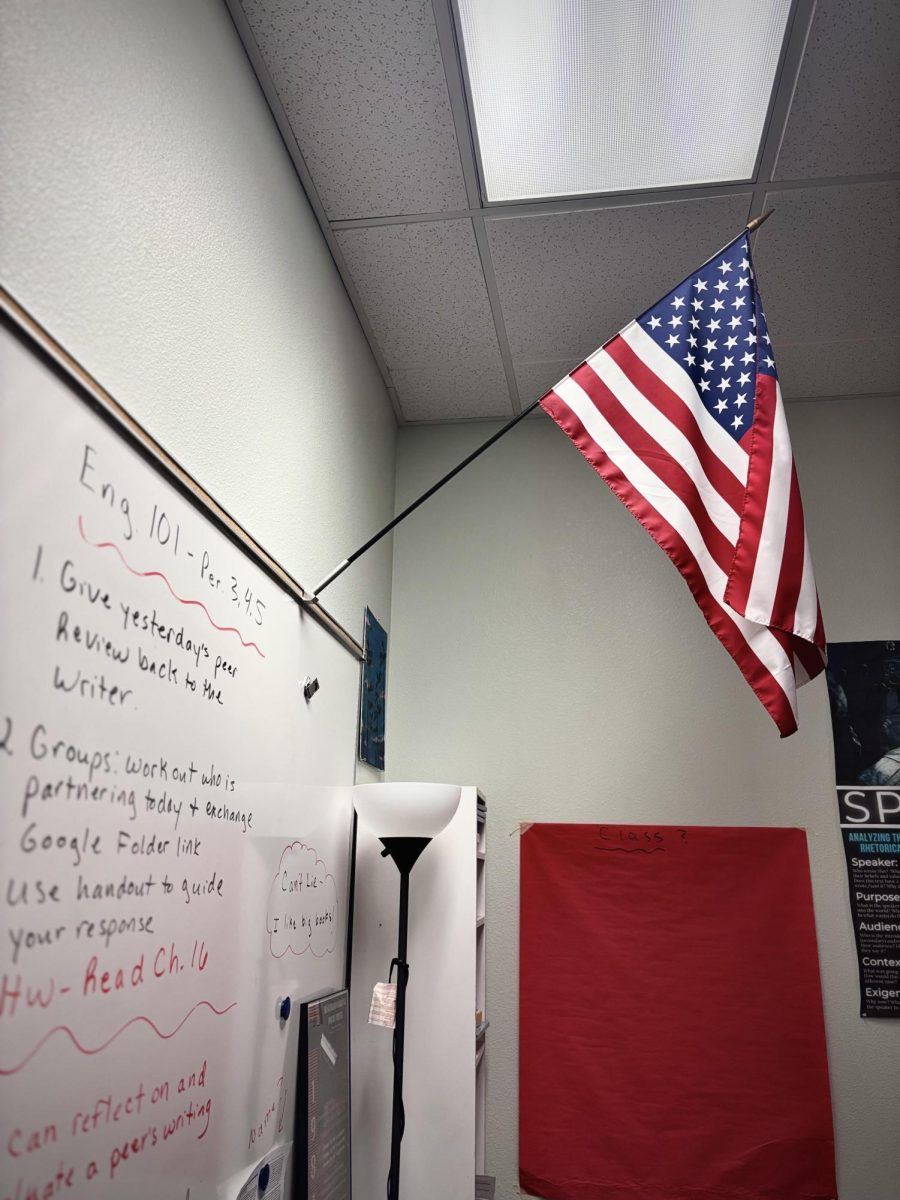Five years ago, the COVID-19 pandemic forced us to stay inside of our homes for months on end. From March 2020 to August 2021, most of my time would be spent in some relation to a video game, either playing one myself or watching someone else do so. Without the distraction of video games, I would have been unbearably restless; video games were a staple of my day-to-day life. Like myself, millions of other people also turned to video games as a source of daily entertainment during the COVID-19 lockdowns.
The lockdowns caused an influx of people to buy and play video games at a higher volume. Consequently, while the pandemic-induced lockdowns were sabotaging every other company, video game companies were given the opportunity of a lifetime: (1) people were stuck inside with loads of free time, (2) people were bored and wanted to be entertained, (3) video games were a convenient source of entertainment, and (4) game development can easily be a remote job.
To account for high demand and their unique advantage, game companies hired a large number of people. As lockdowns, travel restrictions, and remote school/work persisted, the audience continued to grow globally. The industry grew along with it, in both global revenue and workforce.
This trend of revenue growth per year continues today. However, since the end of 2022, game companies have been laying off employees by the hundreds. According to Statista, in 2023, approximately 11,250 people in the industry were laid off. In the first six months of 2024, almost the same number of people, 11,000, were also laid off. Therefore, from January 2023 to June 2024, more than 20,000 people have lost their jobs.
Triple-A (massive, high-budget) publishers like Microsoft, Sony Interactive Entertainment, Riot Games, and Electronic Arts (EA) have all “streamlined,” “eliminated some roles,” or “chosen to proceed with a sustainable cost structure.” Studios they own, both large and small, unsuccessful and award-winning, have been cut. On May 7, Microsoft announced that they were shutting down Tango Gameworks, despite the acclaim and success surrounding the game the studio had developed, Hi-Fi Rush. Achievements like anniversaries are tainted by layoffs, such as the Riot Games’ League of Legends layoff on Oct. 15, shortly following the game’s 15-year anniversary on Oct. 9. These layoffs have led to projects and entire games being canceled for development, squashing the effort and time put into them.
If the industry is supposedly growing, then why are these layoffs happening?
Many video game media websites like IGN, PC Gamer, and Eurogamer list reasons ranging from losing the pandemic bump, game profits not meeting expectations, cost cutting efforts, and over-hiring. They emphasize that companies’ mismanagement of their employees beyond the picture-perfect pandemic conditions is largely to blame for these layoffs.
With these issues, layoffs have seemingly become a necessary solution for companies, but I believe that another factor has been incentivizing them as well: generative AI. I believe that generative AI will start to, if not already, become a reason for layoffs in the video game industry.
As a whole, AI has become more popular across all industries. Chat-GPT, DALL-E, and Midjourney have acquired immense success and positive public opinion. Companies like Microsoft, Apple, Amazon, and Meta have created their own AI chatbots to replicate their success: Copilot, Apple Intelligence, Rufus, and Meta AI. Praised for its convenience, speediness, and cost-cutting capabilities, generative AI has been used in emails, advertisements, and even public apologies; social media and short-form videos have become infested with AI generated videos and images.
It is entirely plausible and likely that AI will stick around and spread to more industries. Millions of dollars have been invested into the development of AI. NVIDIA, an American hardware and software company, has reached all-time high stock prices because of the powerful AI-computing GPUs that they design. Companies and investors will not let the money and time they have put into AI go to waste so easily. It is also certain that AI will continue to improve day by day. GPUs that process AI will become more efficient, and AI itself will become better at replicating reality and generating entities.
In the gaming industry, discussions and use of AI have already begun. For example, in July, SAG-AFTRA announced a strike against video game publishers, stating that they would not accept job offers from them unless there were protections against AI for their voice actors. Meanwhile, there are now AI coaches for competitive video games like Fortnite, League of Legends, Valorant, Overwatch 2, and Rocket League. Backseat AI, one of these AI projects, has coaches for League of Legends with the voices of popular creators like Tyler1 and Emiru.
Game companies themselves have been planning to utilize AI. On Sept. 17, EA announced at their Investor Day event that AI was going to be the focus and center of their company. This announcement comes after EA laid off 670 employees in March. Later on in the event, EA’s chief strategy officer presented a demo of two people using AI with prompts like “make a maze out of cardboard boxes,” and “make it more epic,” to create a game. Though the video was pre-rendered and not a live demonstration, nor was the game itself very impressive or unique, EA’s goal was clearly shown: to rely on AI for the creation of games. EA also happens to be one of the companies named in the SAG-AFTRA strike.
An AI revolution is fast approaching. What does this mean for the game developers and artists under employment of pro-AI game publishers? Will these companies continue to employ those people, or would they, as companies focused on growth, cost-cutting, profit margins, and interests of their stockholders, opt towards laying off their employees and using AI to make their games for them?
Publishers like Nintendo have said they choose not to use AI whatsoever, while others like Larian Studios say that it will be used as a developer tool, but will not touch the creative side of development. Time, financial circumstances, business strategy, and their morals as a company will ultimately determine whether these companies keep their word.
As someone who plays games and appreciates the effort and passion of game developers, I am concerned to see so many layoffs; the future of these people’s careers, and games as a whole, are at stake. It is clear that generative AI poses a large threat to creative jobs. Human imagination is what defines art and the creativity necessary to create it; AI art will never be equivalent to human art, no matter how “good” it may be. It is imperative that we pay attention to signs of AI everywhere, especially when it relates to the authenticity and integrity of the media we see and pay for.
Though this rising pro-AI sentiment may not be a good sign for the video game industry, independent developers and studios are growing in popularity and financial success. It seems as though many are returning to how games were originally created: in small studios working closely with others, motivated by their passion to create.






